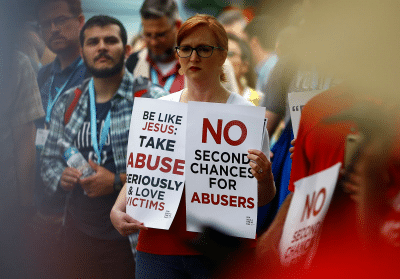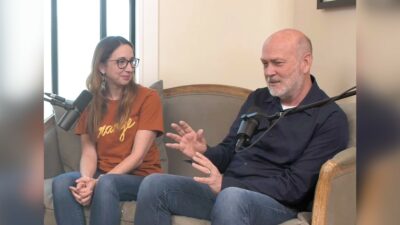On Valentine’s Day, 2019, I entered the chapel of the school where I was then teaching. It was the Thursday after the Houston Chronicle published the first few installments of its series “Abuse of Faith,” which blew the lid off of a decades-long sexual abuse scandal in my denomination, the Southern Baptist Convention.
Along with the harrowing stories of sexual violence and cover ups, the Chronicle also compiled a database of 263 “officials and volunteers convicted of sex abuse crimes.” Four offenders were from that state where I lived. And two of those had attended the Southern Baptist school where I was teaching Old Testament and Hebrew.
The speaker’s chapel sermon that morning started out well enough. It was about romantic relationships and what to look for in a spouse—apropos given the holiday. Toward the end of the sermon, though, the speaker addressed the “ladies” in the room, offering his own advice for how to attract a mate.
He said that women should consider themselves like a house, and if their phones aren’t ringing, that’s because they aren’t caring for their house. Specifically, women should “mow your lawn.”
My mouth fell open. And soon after, I started receiving text messages from others in the room. “What in the world??!” “no no no no no no no.”
Your tax-deductible gift helps our journalists report the truth and hold Christian leaders and organizations accountable. Give a gift of $30 or more to The Roys Report this month, and you will receive a copy of “Hurt and Healed by the Church” by Ryan George. To donate, click here.
The speaker paused for a moment while the laughter in the room quieted, then (buoyed by the crowd’s response?) he pressed on with his analogy. Women, he said, should be careful who they let into their “houses,” because we all know what we call houses with people coming in and out of them all the time: crackhouses.
I sat in my seat, dumbfounded and deeply sad. I had just learned that hundreds (thousands? who knows?) of women and children—people created in the very image of God—were abused by men who pastored and volunteered at churches in my own denomination. And now, I was listening to a preacher reduce women to objects—houses to be maintained and kept for another’s pleasure.[pullquote]I had just learned that hundreds (thousands? who knows?) of women and children . . . were abused by men who pastored and volunteered at churches in my own denomination. And now, I was listening to a preacher reduce women to objects—houses to be maintained and kept for another’s pleasure.[/pullquote]
Immediately, I raised objections to the sermon to my administrators. Sadly, they responded by trying to bully me into silence. And soon afterwards, I resigned.
But as I’ve reflected on that experience, I’ve realized that at the root of this type of preaching, and abuse in general, is a denial of a fundamental tenet of Christianity—that every human being is made in God’s image. And if we want to stop abuse in the church, Christians must once again embrace that humans are not merely objects for others’ enjoyment, but reflections of our Creator.
That may sound elementary to you, but this belief in the imago dei has changed everything about my life. How I talk to my kids, the way I interact with my wife, the food I eat, the films I watch, the websites I visit. All of it.
Theologians and normal folks have spent a lot of time talking about what exactly the image of God is. But there is important cultural clue that can help us discover what it means to be made in God’s image.
In the Old Testament world, this word “image” referred to little statues that kings would fashion, which looked like them. They would set them up around their kingdom, placing them at the very edges of the kingdom as boundary markers to show that the land the “image” was on belonged to the king.
These statues were also placed in other spots around the kingdom, all with the intention of showing the people that the king was, well, the king. They reminded the king’s subjects who their lord was.
So, when the Old Testament uses this word “image” to talk about the creation of humans, it has in mind at least the idea that the image-bearers—humans—would remind everyone else who owned the kingdom. They were, in a very real sense, extensions of the King who created them, and wherever these images were, they extended the King’s rule to that place.
Thus, being created in God’s image sets humans uniquely apart from the rest of creation. They are the representations that the King made to demonstrate his rule over his kingdom.[pullquote]Thus, being created in God’s image sets humans uniquely apart from the rest of creation. They are the representations that the King made to demonstrate his rule over his kingdom.[/pullquote]
More importantly for our own cultural moment, it sets men and women in equal relationship to each other. They both bear God’s image—not one more or less than the other—as his representatives on earth.
In trying to make sense of the abuse and betrayal of so many in the church—first by the abusers themselves, and then by the leaders who covered up or excused abuse—I find myself returning to this key truth found in Genesis 1:27: “(I)n the image of God he made them. Male and female he made them.”
This has been my grounding as I have searched for a way to process my own experiences and the experiences others have shared with me.
Genesis 1:27 is significant for those of us who once were blissfully unaware of the depths of abuse in our churches, for it secures our understanding of who and what people are. Despite any theology or ideology or actions to the contrary, people are people. They are not objects.
Being convinced in our bones that this is true means that when we see the exploitation of the weak and the protection of the powerful, we know that it is not how the Bible envisions things. A person’s value lies in their creation in God’s image. And that doesn’t rise or fall according to how much power they have.
This is key because the more you listen to survivors of abuse in the church, the more you’ll struggle (or at least the more I struggle) with holding to the same faith professed by abusers and enablers of abuse.
Genesis 1:27 also gives us courage for speaking plainly against abuse and the systems that enable it.
So, when we hear sermons or podcasts or songs or lectures that degrade people, we can dismantle that teaching with the confidence that our view of humanity is grounded not in what a pastor or some other person says, but in Scripture. Such confidence in who humans are gives us courage to stand up with, and for, survivors of abuse. We know that regardless of the consequences, and there will be consequences, our stand is righteous.
Finally, as we reckon with sexual abuse in the church, Genesis 1:27 shows how abuse survivors should view themselves, and how other Christians should relate to them. Trauma survivors are much more than a series of horrific sins committed against their bodies and souls. They are image-bearers.
So, it will not do to proffer up theological niceties about forgiving and forgetting. Instead, we must weep, mourn, love, laugh, embrace, listen, think—in short, we must do all those things that make us humans in the first place.
And we must realize that abuse does not begin in the actual physical or verbal act. It starts in the heart and mind. That’s where somehow the thought got lodged that all humans are not actually human, that they are not images of God reminding us of his rule over all the earth.
That is why confronting the sexual abuse crisis—while holding on to my faith in the midst of it—has meant grabbing on to Genesis 1:27 with all I am.
 Russell L. Meek (PhD Midwestern Baptist Theological Seminary) is a speaker, writer, and professor who specializes in the Old Testament and its intersection with the Christian life. You can visit him online at RussMeek.com.
Russell L. Meek (PhD Midwestern Baptist Theological Seminary) is a speaker, writer, and professor who specializes in the Old Testament and its intersection with the Christian life. You can visit him online at RussMeek.com.




















26 Responses
This is a stunningly beautiful article. Almost brought me to tears. As a discipler in the trenches ministering specifically to abuse victims, it is an affirmation of the significance of that messy, challenging, important work. Thank you for writing this and taking a stand at great personal cost.
Never heard of Russell Meek and would not ever want to be a part of a Southern Baptist Seminary which alone gives me a bad taste. At the same time though if I heard a preaching tell women congregants to “Mow your yard!” That allusion to something else would be disturbing. But, dont think it would ever rise to the level of resigning my position over it. At most maybe submitting a complaint of inappropriate language and request leaders review the issue.
Personally, I get the impression that Dr. Meeks had other issues and that was only the tip of the Iceberg that set him off. If that is the sole issue that to me indicates that Dr. Meeks is hyper-sensitive. Further, hate to use millenial and Gen X’er internet language but it would make me think of the words “White Knighting” or Soy-Boy thinking that Dr. Meeks has.
Did you actually read his article? Did it sink in at any level? You reduce a thoughtful Christian brother wrestling with the call of Christ on his life, a man made in the image of God, to a “Soy Boy.”
Perhaps you didn’t get it because the article is about you. I hope not. I encourage you to read it again and ask the Holy Spirit to speak to your heart.
a white knighter wouldn’t actually resign from a professional position @ a university… Dr. Meeks put his $ where his mouth/heart is and walked away from a toxic culture… that is biblical and takes courage… have nothing to do with the deeds of darkness… have nothing to do w those who have a form of godliness but deny it’s power… very few in similar positions of leadership are actually willing to take the action Dr. Meeks did by doing what was right… many are willing to speak words that sound good, but those words are often empty as few leaders are willing to pay the price that often goes with it…
It wasn’t just the words of the speaker that Dr. Meeks found inappropriate; it was the reaction of the administrators to his bringing up the issue. He said they tried to bully him into silence. It is because of such silence that abuse has become rampant in our churches. As well as damaging the victims, such abuse damages our testimony for the Lord. We must live out the Scriptures if we are to honor God and bring light into the darkness. I thank Dr. Meeks for addressing this issue and using God’s Word to do so. We can no longer stay silent. Indeed, we never should have been silent when those who claim the name of Christ, refuse to claim and follow His commands.
To those not familiar with the “Dirk Dirksen” here, he is a habitual troll and not to be taken seriously, modeling his commentary after the actual person by the same name, who is described as follows: “Mr. Dirksen, who called himself “the pope of punk,” was known for peppering audiences and performers alike with abuse and insults.” (https://www.sfgate.com/bayarea/article/Dirk-Dirksen-pope-of-punk-amused-insulted-2466523.php)
He likes to make trouble and seems to have a reading comprehension issue.
Personally, imago dei may be the one theological truth that came most natural to me in life. From childhood I was distraught that babies could be torn apart through abortion and attended Operation Rescue events and held pro-life signs outside abortion clinics and went through school and adulthood always advocating for the right to life in any way I can. My first job after Bible college was delivering pizza. There was an entire crew of drivers that would wait in the back of the pizza shop for orders to deliver. It was so shocking to me to hear the way some of these guys talked about women and objectified them. I remember trembling one time out of shock that a person could dehumanize another person, especially a female, like that. My thought on the all too common response of religious leaders to victims or witnesses to forgive and forget abuse or corruption is that if God wants us to love our enemies so much that we would be willing to forgive them and repay evil with goodness, how much more would he want us to love victims enough to at least protect them from abusers and seek justice for them. When religious leaders tell you to love perpetrators more than victims, I feel that is one of the worst perversions of Scripture that people push.
Seems to me that sexual and physical abuse of females is worldwide and in all cultures and is as old as testosterone and sin. Most men are stronger than women and are able to overpower them and men have no clue what its like to always be on your guard against rape and assault. What is so tragic is the Church hiding and perpetrating these sins! This issue is so important to keep exposing until the day the church finally comes to grips with it. God will not be mocked……these sinful men will give a full account for their actions…God sees each victim.
You’re right about sin. I wouldn’t blame testosterone because that can just as well be used to enhance a man’s affections and protective instincts for women. There’s a reason men are more protective of females than males and I think testosterone has something to do with it. I suppose it’s how a man’s brain interprets their testosterone whether they become a protector of predator of women.
My experience writing this article led me to a lot of thought and questions about how men can do things like this and why my feelings for women lead me to the exact opposite behavior as these men and it became clear testosterone is being used in two completely opposed ways. Rather than driving me to get sexual pleasure at any expense of any other person it drove me to feeling willing to do whatever I possibly could and take any risk necessary to take a protective stand with these young women and confrontational stand toward their abusers. https://www.sandiegoreader.com/news/2019/aug/28/cover-shark-bait/
Eric Bartl , that was a devastating article. (Solidly written, too: no Homophone Howlers or Comma Chaos.)
A lot of psychologists make the case that “testosterone” or ordinary sexual desire isn’t the real point of these situations. Manipulation or the sheer exercise of power over others is the real thrill.
James MacDonald seems to be an illustration of this point. Although there is a believable accusation of his having touched a woman staffer inappropriately, almost all of the story is about his abuse of power in non-sexual ways.
Cynthia, the editor at that paper has taught me about the importance of concision and I’m a person who tends to be longwinded when writing. Interesting phrases. They’re new to me. I take that to mean writers should avoid using homophones and that too many commas are bad? Homophones is something that hasn’t yet crossed my mind in writing. Another thing about that editor is he frowns on adverbs, to the point I was told not to use adverbs. But I’ve found there are times I cannot communicate what needs to be without an adverb. Maybe that’s the point, to narrow them down to those cases.
A “homophone howler” is when the substitution of a word that sounds the same makes the sentence funny. Mixing up it’s – its – its’ or there – their – they’re is just an error. Comma Chaos occurs when the writer is rambling on and on, and he puts commas in at intervals to indicate that he needs a breath.
If your editor emphasizes concise sentences, comma chaos is unlikely.
I had an experience writing a cover story about young women who were victims of sex predators, including their own high school teacher. It led me to a lot of thought and asking questions about how any man could bring himself to do such a thing and why my feelings for women lead me to an exact opposite kind of behavior. It seems while testosterone drove these men to pursue pleasure no matter the harm caused to other people it was driving me to a willingness to do anything I could and take any risk necessary to protect these victims and confront their abusers. I tried posting a link to my article but apparently comments with links are disabled. If anyone wants to read it look up San Diego Reader Shark Bait.
Russell thank you. Going through a major court case about abuse I need the reminder of the Imago Dei
This article is from the heart-felt conviction that each of us bears God’s image, and deserve to be respected because God even honors us. Dr. Meek did not treat this topic as an academic issue, or an organizational issue, but a life issue. I really appreciate his tender spirit before our Creator.
Whenever I read that a church or an institution hires someone to investigate a sexual crime, I wonder what their priorities are really at. It’s sad that I have lost some trust after reading so many stories. There is something that is missing in the lives of many leaders today. That is a deep oneness with Jesus our Savior.
I agree with Dr. Meek’s point about the “imago dei” in every human being, and how sexual (and other) abuse happens when one person sees himself as “really a person” while other people are “not really.”
However, I also think an important point, especially in the situation he related, is the theological position that women exist for the utility of men. This makes all women, in a sense, “contingent beings,” “not really full people” in relation to all men.
This concept has far reaching implications. If many pastors understood this concept, then they would not so easily buy into “wokeness”, BLM, CRT, etc. etc. They would understand true Biblical Justice and not some ideology mixed with Marxism, Socialism, Anarchy and Racism. God is a God of justice. Read about it. It’s in the Bible.
It is amazing how so much of the church is buying into the world’s racist ideologies that are going around right now. Even Mark Jobe said there is still systemic racism in America. It’s a shame because the church and the world needs leaders like him to lead and point people to the truth instead of confusing them with lies. And of course Ed Stetzer never stops beating the race-baiting, racist, race-dividing drum.
I came across an interesting paper about DL Moody and it gives a clue on how Moody would have reacted to BLM and Antifa and the general rising spirit of Antichrist/lawlessness. Compare that to how Christian leadership is reacting today. Historian and Theologian Myron Raymond Chartier wrote about the social unrest of the 1880s. “…discontent finally climaxed in the open violence and horror of the Haymarket riot. Moody and his friends looked fearfully to the future, seeing in these violent protests a threat to law and order…’Either these people are to be evangelized or the leaven of communism and infidelity will assume such enormous proportions that it will break out in a reign of terror such as this country has never known.’…In 1886 he argued the necessity of his school as a counter force to radicalism…He viewed men of labor as individuals rather than as a part of a class…Moody had little use for the social gospel.”
This is one of the best posts I’ve seen on JR’s site. We need to see all people made in God’s image. Only then will we respect and love them.
Wise article, and Cynthia W. above noticed the key point.
A lot of human culture sees women as second-class beings, only useful for the production of children and as receptacles for men’s desires. Unfortunately, much of the conservative Evangelical church has adopted the same mindset (I thought about referencing an infamous Mark Driscoll quote, but I’ll refrain). As long as the subjugation of women is treated as an essential doctrinal truth (and the SBC has in recent years moved further to the extreme on that position), men will be conditioned to see women as objects for their use (and, too often, abuse).
A worthwhile take on the misogyny that infests much evangelicalism is found in the recent book “Jesus and John Wayne” by a Prof. at Calvin University.
Of course abusive men can also be found in churches that affirm the equal status of women before God — Bill Hybels being a prime example. But women at least have a better chance of being treated well in church cultures that affirm their equal standing as humans created in the image of God and as full members in the Body of Christ.
We also might want to consider that the marriage of a man and a woman who both honor God, that group of three is the image of God here on earth, a trinity, not man alone as singular as but mankind (male, female) who follow the Divine pattern. We note that Satan didn’t bother Adam until his partner arrived which completed the threesome duplicating Gods image here on earth. That original couple along with their creator was too much of a threat, such that Satan became directly involved. Might we also consider the reason God hates divorce is because it ruins His image here on earth?
This is some good teaching; timely and Biblical… I’d like to see this extended to all people, especially those outside the church walls. Let’s go beyond treating the women in our churches better; can we, even though we may disagree with their idea or even actions; can we extend this to gays?, to liberals/progressives?, to Democrats?, to Muslims and other foreigners? In many of our conservative evangelical churches, maybe we’re coming around to treating women as better than objects, but I’m not sure I see a lot of the same towards all these other groups of people… instead I see a lot of Christians, without shame or awareness, actively degrade and dehumanize all of these and more… God help us do better!
As it stands, the church itself is doing little to centralize and publicize narratives of abuse. God bless us all!